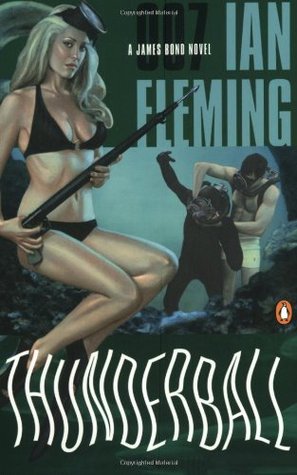

“It just occurred to me that life’s too short. Plenty of time to watch the calories when one gets to heaven.”
Thunderball is another fairly solid outing in the James Bond series. It’s a little bit spotty and formulaic, and at times it strays quite far from the central appeal of its main character, but there’s plenty of secret agent shenanigans to get into. It doesn’t bring much of anything new to the series—save the introduction of criminal organization SPECTRE and its leader Ernst Stavro Blofeld—and is jaggedly paced, with some of Fleming’s diversions landing very awkwardly. I have found that as the series has gone along, and became increasingly popular in its time, Fleming’s confidence has grown, and this is very evident in Thunderball. In For Your Eyes Only, he tried some fresh storytelling methods and was largely successful. Here, his self-assurance leads to some wonderfully memorable asides and to some pleasant attempts at erisimilitude. His confidence leads to some downsides, though, as he stretches his proven formula to its credible limits, putting too much emphasis on detached backstories and contriving situations that smack of his Hollywood aspirations (the book was originally a film script). Like most of Fleming’s oeuvre, Thunderball is an uneven but fun experience—it’s not great literature, but it’s enjoyable for what it is and not too taxing on the brain.
Well, none of the faces meant anything to me until I came across a little guy with a furrowed brow and a big egghead with pebble glasses who looked like a Mormon who’s got into a whorehouse by mistake.
The first huge contrivance, which is not something new for Fleming, is that Bond brushes up against the terrorist organization by sheer coincidence early in the book. Due to Bond’s smoking and drinking habits, his physical examination determines that his health is poor, so M has him sent to a two-week clinic for a juice cleanse and spinal traction. While there, he spots a man with a symbol tattooed on his wrist, which indicates that he is a member of the Red Lightning Tong. This whole section is completely ridiculous, from Bond agreeing to the retreat in the first place to his deadly games with the criminal, who just so happens to be integral to SPECTRE’s plot for world domination.
Then we zoom out. SPECTRE sends communications to the Prime Minister indicating that they’ve hijacked a military aircraft and stolen its two nuclear bombs. They threaten to use them on two major cities unless a steep ransom is paid. On a hunch, M sends Bond to the Bahamas to investigate along with his old sidekick Felix Leiter, who had been dismissed from the CIA after a run-in with a shark in Live and Let Die but was called back into action for Thunderball, a frenzied response to SPECTRE’s demands.
And there was no answer to it. In a few years’ time, if the experts were right, there would be even less answer to it. Every tin-pot little nation would be making atomic bombs in their backyards, so to speak. Apparently there was no secret now about the things. It had only been the prototypes that had been difficult—like the first gunpowder weapons for instance, or machine-guns or tanks. Today these were everybody’s bows and arrows. Tomorrow, or the day after, the bows and arrows would be atomic bombs.
The identity of the bad guy is never in doubt, as Bond becomes acquainted with wealthy treasure hunter and yacht owner Emilio Largo almost immediately upon arriving and suspects him from the first. There’s much less overt violence than in some previous books, and considerably less sex, drinking, and gambling. There’s also the matter of Largo’s mistress, Dominetta Vitali, who is one of least caricatured Bond girls thus far in the series, seducing Bond as much as he seduces her and avoiding the clichéd infantilism that plagues so many of Fleming’s women.
Considering the bloated opening section and the unnecessarily thorough backstories of several characters, Thunderball is a very clunky affair, and one that does not bring enough new content to the table to justify another James Bond adventure. But there’s still plenty of bright spots, and Fleming’s writing has matured into a decently readable style. And I will always appreciate the author’s deep love of places, and his descriptions of architecture, sea creatures, and landscapes remain highlights of the book. As I’ve been lukewarm on the series since Casino Royale, it’s not much of a surprise that this one didn’t do very much for me.